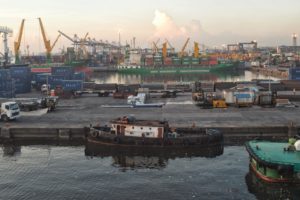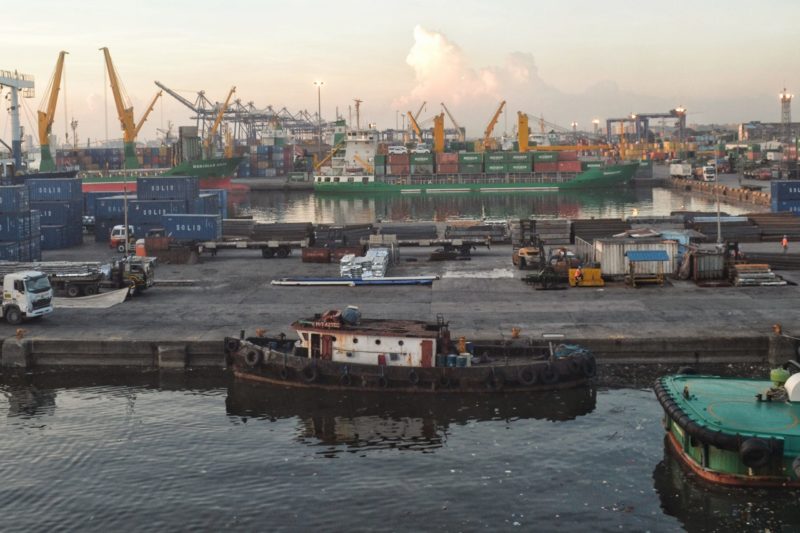 The Anti-Red Tape Authority (ARTA) is asking the Department of Transportation (DOTr) to explain the basis of a recent order requiring domestic shipping lines to assign space on their vessels and provide preferential rates for food and agricultural products.
The Anti-Red Tape Authority (ARTA) is asking the Department of Transportation (DOTr) to explain the basis of a recent order requiring domestic shipping lines to assign space on their vessels and provide preferential rates for food and agricultural products.
ARTA deputy director general for Legal Atty. Ernesto Perez posed the question in a July 20 letter to Transportation Secretary Arthur Tugade after the Philippine Inter-island Shipping Association (PISA) complained about DOTr Department Order (DO) 2020-007.
READ: Domestic lines ordered to cut agri, food shipping rates by 40%
DOTr on June 24 issued DO 2020-007, which ordered all domestic shipping lines to extend a discount of no less than 40% of their shipping rates for all agricultural and food products. It also required domestic shipping lines to allocate no less than 12% of a vessel’s cargo capacity per voyage for the exclusive accommodation of agricultural and food products.
PISA argued the order “appeared flawed”, “was issued allegedly without proper consultation and without any factual or legal basis” and poses a threat to financial viability of shipping lines.
It said member shipping lines already carry agricultural and food products at more than 12% of their cargo capacity.
PISA also said the legal requirement of prior public consultation under the Revised Penal Code “was not observed as stakeholders, especially those that will be adversely affected, was not consulted prior to its issuance.”
Sought for comment, DOTr assistant secretary for Communication and Commuter Affairs Goddes Hope Libiran told PortCalls DOTr fully complied with requirements of the law when it issued DO 2020-007.
She noted the order was issued in compliance with Inter-agency Task Force for the Management of Infectious Diseases Resolution No. 46, which approved DOTr’s recommendation enjoining all domestic shipping lines to allocate a percentage of cargo space exclusively for food and agricultural products, as well as to charge preferential rates to such cargoes.
She added DO 2020-007 already outlines all the legal bases for validity of its issuance.
In a position paper on DO 2020-07 dated July 13 and submitted to DOTr, PISA sought the suspension of the order, saying it was “compelled to make this request as it clearly appears that the subject DO was issued without thorough regulatory impact assessments.”
PISA explained its members did not increase basic freight rates during the enhanced community quarantine/general community quarantine periods “despite experiencing substantial reduction in volumes—more or less 70%–and significant reduction in the frequency of its voyages, and despite continuing to incur fixed costs for crew salaries, food supplies, fuel, etc.”
It added, “Some ships are even constrained to be laid up and remain at anchorage but are constrained to paying fixed PPA [Philippine Ports Authority] usage fees as well as for piled up storage cargoes on shipments that cargo owners cannot retrieve due to transport border restrictions, facing ships to queue for 3 to 5 days at some outports.”
PISA said the mandate on which the DO was based appeared flawed since RA 11469 or the Bayanihan to Heal as One Act, has already expired and has yet to be extended.
Moreover, PISA said prescribing the 40% discount on rates and mandating the 12% cargo allocation, “the DO overstepped the mandate under (RA) 11469.”
The association noted that a section under RA 11469 authorizing the President through his alter egos (department secretaries) to “regulate and limit the operation of all sectors of transportation…” was interpreted as allowing the regulation of domestic shipping, including its rates.
And yet domestic shipping under RA 9295 (Domestic Shipping Act of 2004) has already been deregulated.
PISA claimed the provision under RA 11469 in question “is the limited operation of public transport—i.e. which ships can sail insofar as sea transport is concerned—during the period of state of public health emergency under Proclamation No. 992.”
Threat to transport?
As to the purpose of the DO to “help ensure the viability of food production and delivery thereof,” PISA noted “there was no factual data to support that there ever was a threat to the transport nor distribution of food nor has food supply been precariously low at any region/area in the country.”
It said a table presented by the Department of Trade and Industry (DTI) in a meeting showed production capacity and inventory levels were maintained for essential food items such as coffee, bread, canned meat, sardines, among others.
PISA also asked government to provide the basis for the 40% discount of rates and why it imposed the discount “only on domestic shipping when it is but a ‘part’ of the whole logistics chain.”
Shipping, it pointed out, “is only a fraction of the total cost of products. Accounting for a substantial portion of transport cost is land/trucking transport and cargo handling costs which should be discounted as well to make much difference in ensuring the viability of food production and delivery.”
Moreover, PISA said DTI has “clearly established that there was no rate increase imposed by the shipping lines, so how can the rates be deemed excessive?”
It said, “It must be further noted that any change in price will not necessarily translate to a proportionate response in demand such that shipping freight is not elastic. What is true though is that the plight of the domestic shipping remains uncertain.”
The association lamented the “painful reality that to this date government has taken domestic shipping for granted,” noting this is despite domestic shipping efforts to cooperate and participate in government endeavors such as supertyphoon Yolanda relief efforts, and efforts to help COVID-19 quarantine operations and “Balik Probinsya” program, among others.
No prior consultation?
Finally PISA complained that the legal requirement of prior public consultation under the Revised Penal Code “was not observed as stakeholders, especially those that will be adversely affected, was not consulted prior to its issuance.”
Libiran, however, disputed this claim. She explained the requirement for consultation is provided under second paragraph of Section 9, Chapter 2, Book VII, of Executive Order No. 292: “[i]n the fixing of rates, no rule or final order shall be valid unless the proposed rates shall have been published in a newspaper of general circulation at least two (2) weeks before the first hearing thereon.”
She noted, however, that the first paragraph of the same section also provides that, “[i]f not otherwise required by law, an agency shall, as far as practicable, publish or circulate notices of proposed rules and afford interested parties the opportunity to submit their views prior to the adoption of any rule.”
Libiran explained: “The Administrative Code itself acknowledges the demands of public participation and affords agencies reasonable leeway in affording interested parties the opportunity to submit their views on any rule. With the pervasive and persistent dangers of COVID-19 alongside the urgent need to ensure the availability of agricultural and food products for the consumption of the citizens, it is understandable that the Department has also been constrained to immediately adopt measures to safeguard the interests of the public, who bear the brunt of community quarantine measures and whose situation may be eased by the subject DO.”
She noted the Supreme Court has emphasized the importance of publication in the promulgation of laws and rules, citing the case between the National Association of Electricity Consumers for Reforms and Energy Regulatory Commission, where the Court said that even with the conduct of public consultations with the stakeholders, as long as publication has not been undertaken, such consultations are effectively irrelevant.
“With the publication of the subject DO, the essential objective of due process to inform the stakeholders and the public can be achieved in these unprecedented times,” Libiran said.
Impact assessment
Meanwhile, ARTA’s Perez pointed out that ARTA is still developing the National Policy on Regulatory Management System, which provides for mechanisms necessary in the implementation of the Regulatory Impact Assessment across all agencies covered by Republic Act 11032 or the Ease of Doing Business and Efficient Government Service Delivery Act of 2018.
“While the National Policy is still being developed, the Authority enjoins all government agencies to implement regulations designed to prevent undue regulatory burden in keeping with the Declaration of Policy of RA11032 and its provisions addressing ineffective or detrimental regulations, rules and administrative procedures or systems,” Perez said.
He noted that Section 5 of RA11032 authorizes ARTA to coordinate with concerned agencies the review of existing laws, executive issuances and local ordinances and recommend the repeal of the same if deemed outdated, redundant and/or adds undue regulatory burden to the transacting public.
Moreover, Administrative Order No. 23 issued by the President on February 20, 2020 directs all government agencies to streamline their processes and state the legal basis of the regulations they are implementing.
In order to guide ARTA in its assessment, Perez said is requesting DOTr for a position paper and other supporting documents detailing the policy development of DO 2020-007 within seven working days. – Roumina Pablo





